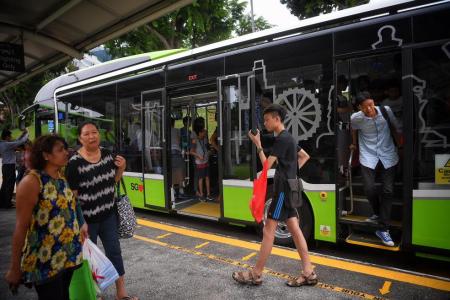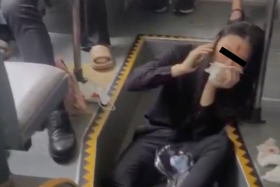Buses less packed, waiting time shorter: LTA
LTA releases figures on first year of bus contracting model
Commuters now experience shorter waiting times and less crowded buses compared with a year ago, Land Transport Authority (LTA) figures showed yesterday.
Additional waiting time has been reduced by 25 per cent for 292 high-frequency services, which are those with waiting times of 15 minutes or less. Of 73 low-frequency bus services, 49 have improved in punctuality.
All bus services have intervals of 15 minutes or less during the morning and evening peak periods. Half of them arrive within 10 minutes, while feeder services run at intervals of six to eight minutes.
As a result, three-quarters of all bus services are less crowded during peak periods.
An LTA spokesman said bus services have also improved across all operators.
For example, Service 63 operated by SBS Transit, Service 960 operated by SMRT Buses, Service 143 operated by Tower Transit and Service 118 operated by Go Ahead have seen good improvements.
To achieve this, an additional 96 buses were added to improve 114 services, said LTA.
Since last year, 10 new services have been added to the bus network, with four more additions by the end of the year.
The improved standards mark a year since the full implementation of the bus contracting model, where the Government owns all operating assets including buses, collects fare revenue and tenders bus route packages to operators.
SUBSIDIES
Close to $4 billion in subsidies will be spent over the next five years under this model.
A total of 1,000 buses would have been added to the public bus network by this year under the Bus Service Enhancement Programme.
Since last May, more than 1,000 bus drivers - 80 per cent of them locals - have joined the industry.
The Singapore Bus Academy was launched in October last year, and more than 1,200 trainees have completed the Enhanced Vocational Licence Training Programme.
Two bus packages were awarded to Tower Transit and Go-Ahead through open tenders in 2015, and 12 packages are operated by incumbent operators SBS Transit and SMRT Buses.
These operators have targets under the Bus Service Reliability Framework (BSRF), which rewards and penalises them according to the regularity of their bus services.
"As all bus services are now required to meet BSRF standards, commuters can expect further improvement to bus service reliability," said LTA.
Singapore University of Social Sciences' transport researcher Park Byung Joon said these improvements are "low-hanging fruit" because of the wide implementation of the BSRF.
"Further improvements in terms of better services and shorter frequencies will require more resources and increased spending. There are also factors such as traffic congestion, which cannot be avoided," Prof Park added.
"The challenge, then, is for these improvements to be maintained over the next few years."
Get The New Paper on your phone with the free TNP app. Download from the Apple App Store or Google Play Store now



